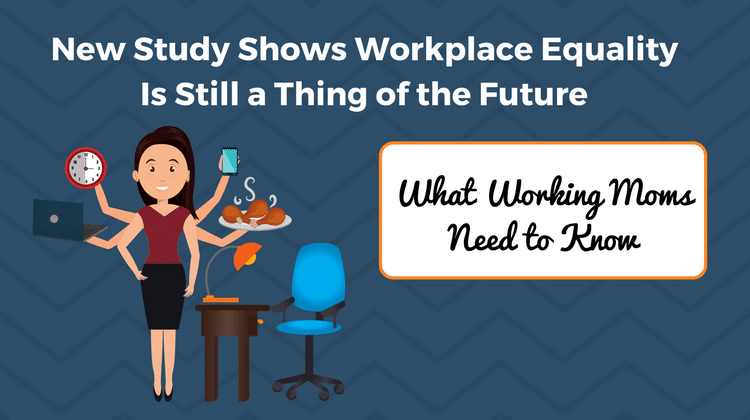
In the market research industry, our daily jobs usually entail project work, tight deadlines, and demanding clients. This fast-paced environment is great for women: we are scientifically proven to be better at multi-tasking, are more detail-oriented, and are better communicators than our male counterparts. But the same thing that makes our field a great fit for us works against us when it comes to work-life balance – especially if parenthood is thrown into the mix. Thus, the pervasiveness of gender inequality in the workplace.
This issue was recently explored in a study from Women in Research (WIRe), “Gender and Career Advancement in the Research Industry.” Representing the second wave of research to show progress from a study done five years ago, the new data showed progress on gender parity in some areas and continued room for improvement, especially for mothers.
I’ve always believed that much of the gender disparity in the workplace stems from parenthood. Although this may just be one of many factors, it’s time to deal with the reality that expectant mothers give employers high anxiety. One of the results of this anxiety is continued inequality on the job.
Data from the Women in Research study focused on the market research industry, which is still struggling to give women equality on most fronts. These findings are indicative of any fast-paced, project-oriented business environment, displaying what women are experiencing across a larger segment of industries. Data indicated that women are making some headway as they climb the corporate ladder, and the gender pay gap is shrinking slightly.
This good news is offset by findings that show job and career satisfaction is stagnant among women, and women perceive more barriers to growth, including parenting. Perhaps the most significant data from my standpoint was the discovery that compensation among parents shows “sizeable (and increased) disparity,” and work-life balance is deemed more obstructive among mothers than fathers.
This and other data uncovered by the study make it clear that mothers still get the short end of the stick – perceived or real – when it comes to parity in the workplace. Working moms should be aware of these trends and looking for proactive ways to work with employers. Some things to be aware of include:
Here is How Pregnancy Can Hold You Back:
Long-term Projects
If you are a lead or key figure on a big project, employers may want to sideline you for continuity and to reduce uncertainty.
Promotions
While you may be on track, a pregnancy essentially carves out a year from your advancement. They put you on smaller work during your pregnancy, then maternity leave, then time to ramp back up when returning … all that can stall a career at least a year.
Colleagues
When you’re out, most companies simply rely on your colleagues to help shoulder the burden. This gives them a chance to shine when you are absent making that above “year stall” even more pronounced
Uncertainty
When you enter into a pregnancy, neither you nor your employers know what will happen next. Complications, extended maternity, a lack of desire to return from maternity – all these intangible unknowns become real concerns for employers trying to decide how to organize for any possibility.
What You Can Do about It:
First, Have a Clear Idea of What You Want.
Every woman experiences a lot of feelings during and after pregnancy that can change. I always knew I would want to come back to work quickly, but when I held my son for the first time, all career plans evaporated. For me, I soon realized I did not have the right skills to be at home, and it was best for me and my family if I went back to work. For many of my friends, these are issues they struggled with for a long time. Do your best to discover what you truly want, and then, always allow yourself the flexibility to change your mind.
Second, Understand How Your Personal Support Group is Going to Help You.
Talk closely with your support network of family and friends who will be helping you through the pregnancy, birth, and early months of being a mom. What can you realistically do at work? What support will you have at home to help you meet those goals? What are your childcare solutions and how can work best fit around your needs?
Third, Develop a Plan.
What projects are you working on at work? How do you want to stay involved? If you could design a transition plan to take over while you’re on leave, what would it look like? How soon are you coming back? What responsibilities do you want on your return? What is your expectation for a promotion or raise? When you start to answer these questions in full, you will have the beginnings of a plan.
Last, Talk Frankly with Your Employer.
As soon as you feel comfortable announcing your pregnancy, have a sit down with your boss and talk candidly about their concerns and your needs. With step three in place, you’ll have a clear vision for how to achieve your goals. This conversation should be about working that vision into what your employer needs so you are both satisfied.
There isn’t much we can do about biology. Women need the freedom, time, support, and resources for a healthy pregnancy, delivery, and early childhood. As employers, we want to do everything we can to support that while still balancing the needs of the company and other employees. It can be a tricky thing to navigate, but being proactive, honest, and collaborative can remove most, if not all, of the factors that will stall your career.
About the Author
With more than twenty years experience, Rebecca Brooks believes market research is failing the brands they support by relying on outdated models. She is a proud partner and co-founder of Alter Agents, a full service market research company redefining research in the age of the promiscuous shopper.